Books published or edited by members of the EUI Alumni Association
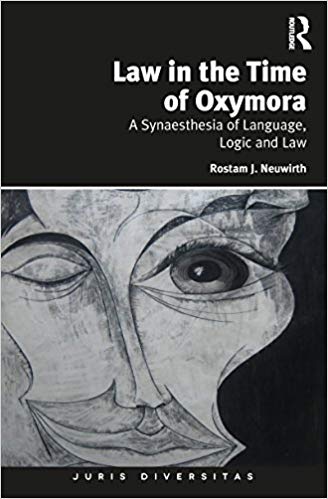
Rostam J. Neuwirth
Law in the Time of Oxymora
A Synaesthesia of Language, Logic and Law
What do different concepts like a true lie, bad luck, honest thief, old news, spacetime, glocalization, symplexity, sustainable development, constant change, soft law, substantive due process, pure law, bureaucratic efficiency and global justice have in common? What connections do they share with innumerable paradoxes, like the ones of happiness, time, globalization, sex, and of free will and fate? Law in the Time of Oxymora provides answers to these conundrums by critically comparing the apparent rise in recent years of the use of rhetorical figures called "essentially oxymoronic concepts" (i.e. oxymoron, enantiosis and paradoxes) in the areas of art, science and law. Albeit to varying degrees, these concepts share the quality of giving expression to apparent contradictions. Through this quality, they also challenge the scientific paradigm rooted in the dualistic thinking and binary logic that is traditionally used in the West, as opposed to the East, where a paradoxical mode of thinking and fuzzy logic is said to have been cultivated. Following a review of oxymora and paradoxes in art and various scientific writings, hundreds of "hard cases" featuring oxymora and a comprehensive review of the legal literature are discussed, revealing evidence suggesting that the present scientific paradigm of dualism alone will no longer be able to tackle the challenges arising from increasing diversity and complexity coupled with an apparent acceleration of change. Law in the Time of Oxymora reaches the surprising conclusion that essentially oxymoronic concepts may inaugurate a new era of cognition, involving the ways the senses interact and how we reason, think and make decisions in law and in life.
Rostam J. Neuwirth is full professor at the Faculty of Law of University of Macau where he also serves as the Program Coordinator of Master of International Business Law (IBL) in English Language. He received his PhD degree from the European University Institute (EUI) in Florence (Italy) and also holds a Master’s degree in Law (LL.M.) from the Faculty of Law of McGill University in Montreal (Canada). His undergraduate studies he spent at the University of Graz (Austria) and the Université d’Auvergne (France). His research interests include notably international economic law and the “trade linkage debate”, intellectual property rights and the creative economy, comparative law as well various interdisciplinary aspects of law and legal theory.
Reviews
'Professor Rostam J Neuwirth has produced a scholarly work of real excellence that will be certain to test the concept of law. In the vanguard of research, his work re-conceptualises the perception and reality of law. Its contribution is more than important. It is fundamental.' (Professor Gonzalo Villalta Puig, The University of Hull, UK)
'Law in the Time of Oxymora, like its title, brings together fields and thoughts that are often considered opposites, to present a well-reasoned and compelling argument about the durability and applicability of western binary approaches across many disciplines. Regardless of your field of expertise - from science to law to art - this book should be read for its original and imaginative insights that are delightfully well written and presented, and which are likely to make you rethink some of your accepted "truths".' (Colin B. Picker, University of Wollongong, Australia)
'Rostam J. Neuwirth’s study of the oxymoron – the word itself represents an oxymoron – in literature, art and science, and, dependent on these, law, shows that binary logic and universal principles without irreconcilable contradictions are difficult to maintain in a globalised world. Not only will the lawyer look differently at law after having read this fascinating book on oxymoronic concepts, the researcher will be delighted by the rich source material the author provides from literature, philosophy, science, law and politics.' (Andreas Rahmatian, University of Glasgow, UK)
'Rostam Neuwirth’s book 'Law in the Time of Oxymora' is a thoughtful and complex investigation of the varying uses of this fascinating figure of speech and its impact on our thought. While Professor Neuwirth focuses on the oxymorons of law, he also examines their use in science and the arts. He takes us on an exciting and informative journey through many areas of knowledge, leaving us more informed and more intrigued about the world and the many ways that we think about it.' (Christine A. Corcos, Louisiana State University Law Center, USA)
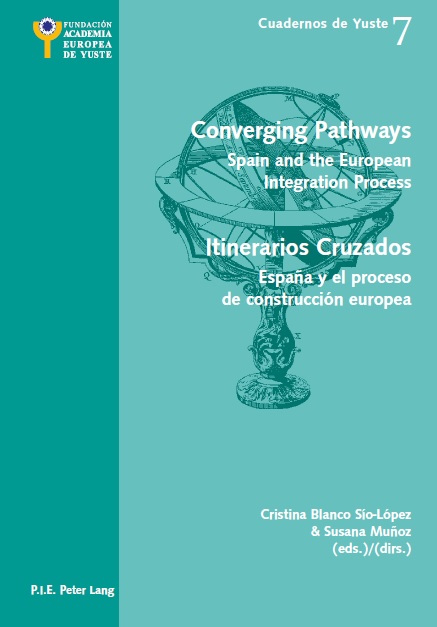
Cristina Blanco Sío-López (co-editor)
Converging Pathways
Spain and the European Integration Process
Europe: the fruit of a willing construction that superseded much of its past darkness by gradually transforming numerous walls, prejudices and conflicts into bridges of cooperation and mutually enriching developments. Spain: An amalgam of creative tensions, of groundbreaking realisations, of successively frustrated and regained horizons and of long fought hopes. This books aims to analyse the vectors and degrees of convergence, the cohesion factors and the changing paradigms of the relation between both in a context marked by crisis and questioning. The key question in this realm is: Do they still revolve around converging pathways? The answer implies, at once, conscious mirrors and new determinations.
Cristina Blanco Sío-López is Assistant Professor in European Culture and Politics at the University of Groningen. In March 2019 she will be ‘Law, Justice and Society’ Invited Lecturer at Wolfson College – University of Oxford. She is also GYA Member and 2018-2019 Council for European Studies – IMSISS Fellow at the University of Glasgow. She previously was Santander Senior Fellow in Iberian and European Studies at the European Studies Centre of St. Antony’s College – University of Oxford, where she remains a Senior Member. She obtained her PhD in History and Civilization — specialising in European Integration History — at the EUI.
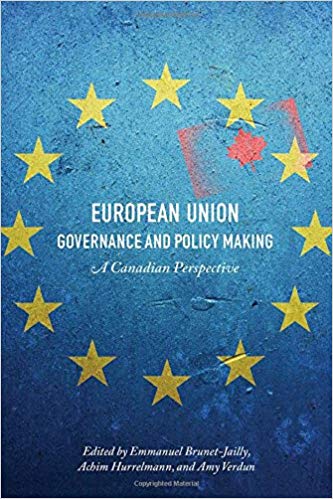
Amy Verdun (et al.)
European Union Governance and Policy Making: A Canadian Perspective
Divided into three parts, European Union Governance and Policy Making examines the political system of the EU (history, theories, institutions), specific policies, and some of the challenges that the EU currently faces, specifically since Brexit. Geared toward Canadian readers who want to learn more about the European Union, the book integrates Canadian content and examples to demonstrate how Canada compares to the EU. The introduction presents three core themes for understanding the EU from a Canadian perspective, and each chapter returns to these, creating structure and coherence throughout the book.
.png)
Carlo Spagnolo
Il Voto apolitico
Il sogno tedesco della rappresentanza moderna (1815-1918)
The apolitical suffrage. The German dream of modern representation (1815-1918)
This book provides the first long-term historical synthesis of parliamentary representation in all the German States which eventually became part of the German Empire, from the Wien Congress up to W.W. I. The development of the general male suffrage, introduced in 1848 and revitalized by Bismarck in 1867, is explained within the complex institutional framework of the Kaiserreich and of its predecessors, the German League of 1815 and the Northern German Union of 1866. The reinvention of the Ancien Regime Estates into modern juridical subjects, such as classes, parties and intermediate bodies is at the core of the study. The symbolic functions absolved by the universal male suffrage in that dynamics is thus linked to a comparative description of the electoral systems and the “regional” belongings of the main political parties in the various German States from 1866 to 1918. The main interest of the topic for today readers lays in the several, even astonishing, analogies between the constitutional problems of the German Empire and the European Union. Both cases show a limited role of parliaments and a “democratic deficit” accompanied by an armonicist idea of representation and a dilemma between economic and political union.
Carlo Spagnolo is professor of Contemporary History at the University of Bari. He has received his Ph.D. at the EUI, Fiesole, in 1997. He has taught and spent research periods in Belgium, France, Germany, United States. He is member of the Scientific Committee of the Foundation Istituto Gramsci in Rome, of the Executive Board of the Association Friends of UE Archives, Fiesole, and Director of the Association for the history of Puglia and South Italy within European integration. He is member of the Direction of the historical journals “Studi storici” and “Ricerche Storiche”. Presently he holds a Jean Monnet Chair (2018-21) and is working on European politics of memory and South Italy.
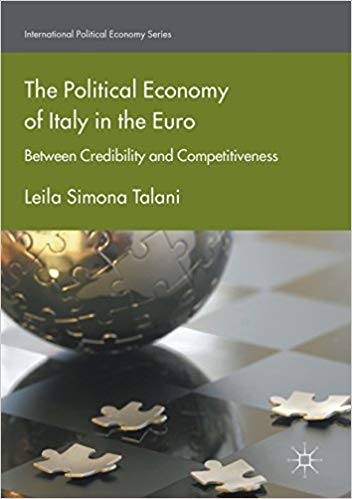
Leila Simona Talani
The Political Economy of Italy in the Euro.
Between Credibility and Competitiveness
This book proposes an alternative political economy framework in which to analyse the question of the credibility of international economic agreements, in general, and monetary arrangements in particular. The focus is on European monetary arrangements, from the establishment of the European Monetary System to the crisis of the Euro-zone. The analysis is predicated around the political economy of Italy’s access and permanence in the Economic and Monetary Union (EMU). The author argues that the case of Italy, which made a concerted effort to join the EMU in the first wave, is particularly striking. Support for the single currency was widespread when it was introduced, yet something went wrong. Nowadays, its participation to the European monetary integration process cannot be easily taken for granted, especially after the vicissitudes of the Euro-zone crisis.
Leila Simona Talani is Professor of International Political Economy and Jean Monnet Chair of European Political Economy in the Department of European and International Studies at King’s College London, UK. Her research centres on the consequences of the global financial crisis for the capitalist structures of European countries.
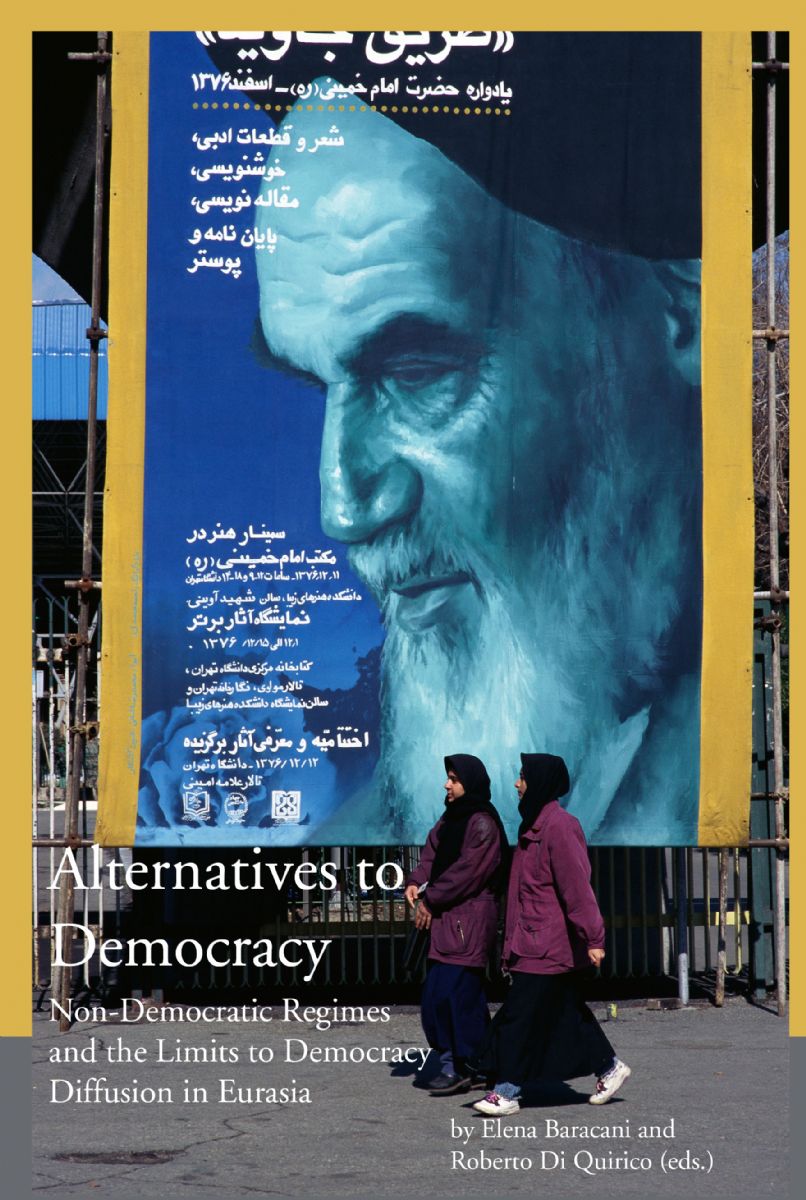
Roberto Di Quirico (et al. eds)
Alternatives to Democracy
Non-Democratic Regimes and the Limits to Democracy Diffusion in Eurasia
When the Soviet Union collapsed in 1991, liberal democracy remained the only ideal model of a political regime applicable worldwide. Then, various students and politicians saw the end of communism as the final and definitive victory of democratic ideology and imagined a future in which democracy would spread everywhere.
Democracy spread widely during the 1990s and the early 2000s. The fall of various South American dictatorships and the European Union enlargement caused a transition to democracy in many countries. However, important areas in Eurasia, in particular, Russia, China and Iran, resisted democratization and reformed authoritarian regimes rose and consolidated in the region. These regimes proved their ability to survive and influenced their neighbours proposing political models that attracted neighbouring countries’ leaders. Thus, new kinds of authoritarian regimes challenged the idea of the unavoidability of the spread of democracy.
Today, the international economic crisis and wide economic growth in authoritarian countries such as Russia and China have renewed the relevance of questions about the democratic model’s superiority, its unavoidable diffusion and the existence of alternative regimes. To answer this question we need to understand if at least one of these regimes is a model. Furthermore, we may discover if it is based on well–defined values, is replicable elsewhere, economically sustainable and able to consolidate and survive.
Roberto Di Quirico is Lecturer in Political Science and Aggregate Professor of International Relations at the University of Cagliari (Italy). A former professor of Politics of Economic Integration (Jean Monnet Module) at the University of Florence, and non-tenure Lecturer in European Political Economy at the University of Bath (UK) in 2005-2006. Since September 2016, he chairs the European Union Standing Group of the Italian Society of Political Science.

Despina Alexiadou
Ideologues, Partisans, and Loyalists
Ministers and Policymaking in Parliamentary Cabinets
For the past thirty years, scholars have debated the role of political parties in fiscal, monetary, and social welfare policies. Some argue that Social Democratic parties are more committed to advancing and maintaining welfare protection, while others claim that party ideology has ceased to explain parties' policy choices due to the constraining forces of economic globalization, deindustrialization, and electoral volatility. Indeed, the empirical findings in support of partisan arguments are mixed. Much of this rich literature treats political parties as uniform and cohesive entities when it comes to forming government policy.
Ideologues, Partisans, and Loyalists challenges this assumption and advances the argument that ideology and partisan policy preferences play a major role in policy choices, yet they are not necessarily observable at the government or even at the party level. Instead, we often need to look at the individual level — particularly at the cabinet minister who is in charge of the policy in question to predict policy outcomes.
Ideologues, Partisans, and Loyalists innovatively argues that cabinet ministers can have very important policy role as policy agenda setters. Yet, not all ministers are equally effective policy-makers. Some make a difference, while others do not. Loyalists are loyal to their party leader and prioritize office over policy; partisans are party heavyweights and aspiring leaders, and ideologues have fixed policy ideas and are unwilling to compromise for the perks of holding office. Only ideologues and partisans can effectively change social welfare and labour market policy, above and beyond what their government mandates.
Despina Alexiadous is Chancellor's Fellow (assistant professor) at the School of Government and Public Policy at the University of Strathclyde. Previously she worked at the University of Pittsburgh (2008-2017) as an assistant professor, the University of Warwick as an ESRC Postdoctoral Fellow and at Duke as a visiting professor.